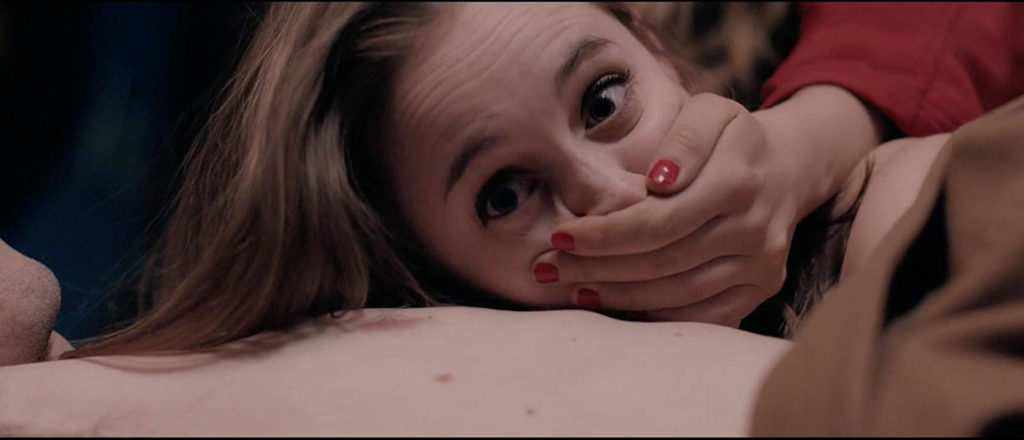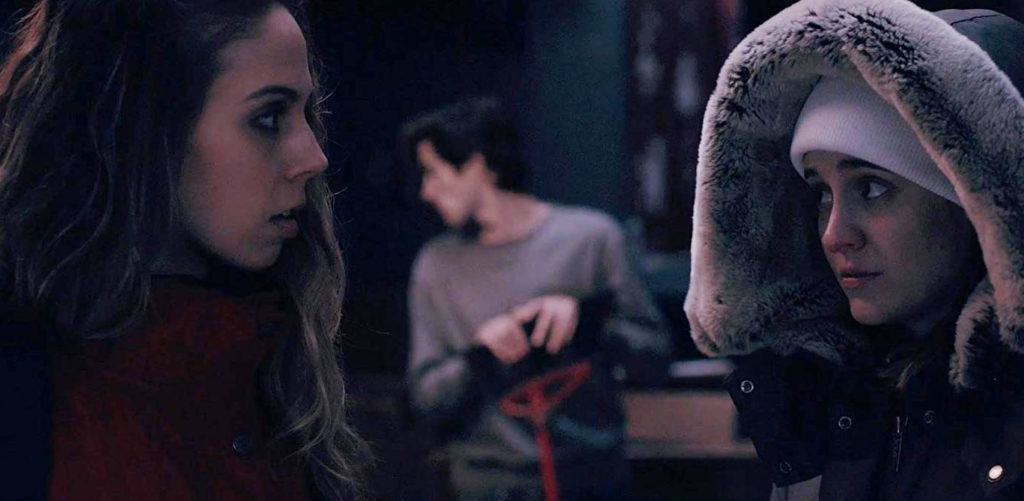It’s obvious that “The Chyrsalis,” written and directed by Matt Kravitsky, tried in vain to capture the spirit of horror films such as “40 Days of Night,” and “High Tension.” The acting is there, but the production value is not, and the result is a short film that feels too short at 27 minutes, and only scratches the surface of the relationship between its three protagonists. It ends bizarrely, pointing at things we, the audience, should glean about one of its leads; but the lessons learned are vague, as is the picture’s overall message.
The basic plot here is that two sisters, Liza and Megan (Maggie Wetzel and Nicole Paige Chaffin) become stranded in the Canadian wilderness when their car breaks down on their way to transport Meghan to college. They seek refuge in a huge container plant from on oncoming storm, where they meet the wayward John (Brian Dole), who claims to be riding out the storm also. However, something is amiss. John seems a little bit too prepared for a storm that hasn’t even hit yet. And it isn’t long before he takes a liking to Meghan, much to the chagrin of Liza (even though it was Liza who initially wanted Meghan to lose her virginity at all costs). Thus embarks a series of events that begin and end, but never really finish, and a film that confuses rather than entertains.
I’m not sure what “The Chyrsalis’” most salient point is. Don’t trust strangers? People aren’t who you think they are? Beware? Im not sure “The Chrysalis” knows either. It features good atmosphere, particularly inside the trio’s makeshift accommodations, filled with smart choices in lighting and sound, but doesn’t really dig for deeper treasure. It has the makings of a college rave – complete with booze, dancing, and sex, while all the while angling to be the “10 Cloverfield Lane” thriller it so clearly emulates. Yes, there’s something about John that just isn’t right, but oh, damn if Meghan wants to find out.
Liza suspects. We see scenes of her thinking something just isn’t right about Meghan’s dream guy (the most sinister occurs after John goes outside for a smoke and comes back in with a full pack). Of course, when we, as the audience, finally find out what exactly John was going outside for (avoiding spoilers), it’s more a head scratching moment than a clever ‘whodunit.’ And Meghan’s sheer protection of John, when he becomes clearly someone not to protect, smacks more of the script’s need for the bizarre rather than actual Stockholm syndrome.

The acting is apt, but not spectacular, with Wetzel, Paige Chaffin, and Dole turning in mostly decent performances. The highlight of Kravitsky’s script, and their performances, is that you do never suspect that they are acting as the proceedings flow rather nicely. The sisters do have nice camaraderie throughout, and Dole appears elusive, that kind of attractive and charismatic killer (yes, he does have a dark side; no, specifics won’t be given away here) you might find on “Dawson’t Creek” or the “Scream”-type movies that littered the late ‘90s.
The soundtrack’s a problem. It’s too absent in important parts and too overly cacophonous in others, specifically during the film’s pièce de résistance, a sex scene between he and Meghan that is scored with a loud, synthesizer driven piece by Steve Matthew Carter that just seems wholly wrong for the scene. Yes, we’re supposed to understand danger is afoot; but the bombastic score takes viewers out of the picture, forcing this danger down our throats instead of quietly insinuating.
At the end of the day, “The Chrysalis” tries, even if it’s tough to deliver. It features capable acting, decent cinematography, and a production value that makes it seem more professional than it ought. The players are all pleasing to watch, and the snow-covered setting, not used enough in horror in lieu of dark woods or haunted houses, is a welcome change. However, the film jumps around a little too much, makes its climax a little too confusing, and, for reasons I could not figure out, adds an air of mystery and touch of the bizarre to Meghan herself. The film, which has several positive elements going for it, would have served better making itself a straight up horror rather than delving for the depths of psychology that it does. It’s only 27 minutes and watches well. But it’s biggest affront is that it could have been so much more.
-by Mark Ziobro


